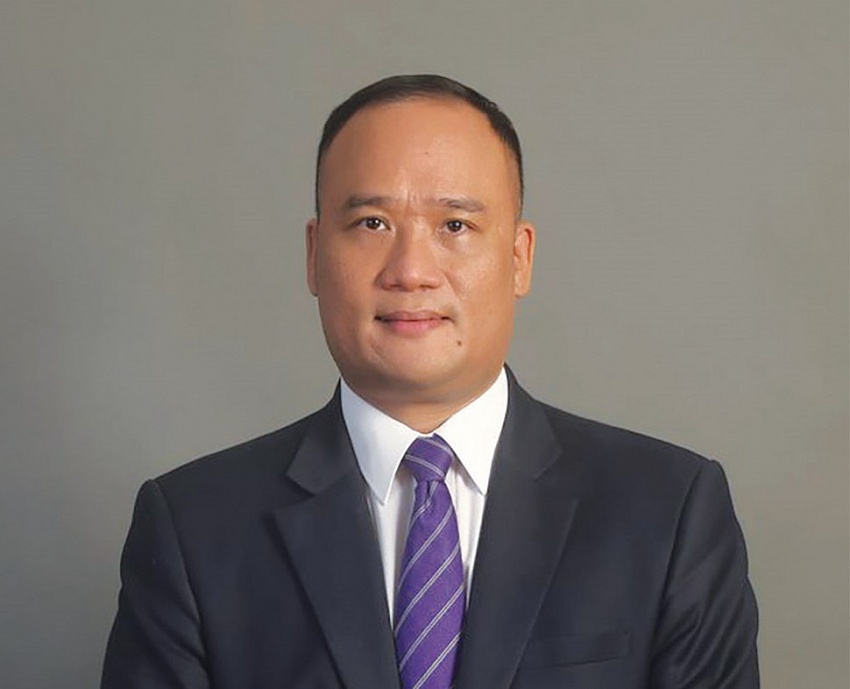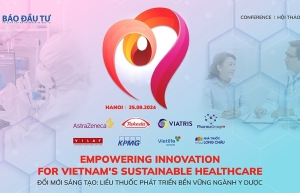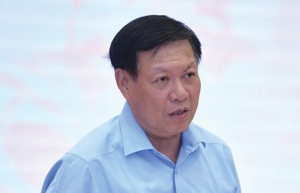Foreign-led groups seize the initiative in healthcare
While FIEs bring advanced technologies and global expertise to Vietnam, their operations are also shaped by a complex regulatory landscape, creating both opportunities and challenges.
 |
| Trinh Luong Ngoc, lawyer, Vilaf |
FIEs play a diverse role in Vietnam’s healthcare sector by introducing advanced technologies, promoting research and development (R&D), and addressing gaps in the local healthcare infrastructure. Their contributions are not limited to products and services but also extend to knowledge transfer, capacity building, and establishing links with local businesses and organisations.
One of the primary roles of FIEs is introducing advanced healthcare technologies that can significantly enhance the delivery of healthcare services in Vietnam. From diagnostic imaging equipment and telemedicine platforms to AI in diagnostics, FIEs bring innovation to fields where local capabilities are still developing. The Law on Medical Examination and Treatment provides the legal framework for introducing these technologies, provided they comply with Vietnamese standards.
For instance, companies like Siemens and GE Healthcare have introduced advanced MRI machines and CT scanners, which improve patient outcomes at major hospitals and promote the development of specialised medical services in Vietnam. By making advanced healthcare services more accessible, FIEs help bridge the gap between public health needs and the existing medical technology within the country.
The 2016 Law on Pharmaceuticals established the legal framework for FIEs operating in the pharmaceutical sector, which has experienced significant growth. FIEs have contributed to the development and introduction of new drugs and therapies, particularly in areas such as cancer, cardiovascular diseases, and infectious diseases.
R&D efforts, supported by international standards such as Good Manufacturing Practices and Good Clinical Practices, have led to the creation of high-quality medicines that meet both domestic healthcare demands. Furthermore, FIEs involved in pharma research and development often collaborate with Vietnamese research institutions and universities, promoting knowledge transfer and building local expertise. These collaborations can help accelerate the development of new therapies and vaccines for community healthcare.
Vietnam offers a wealth of opportunities for FIEs in the healthcare sector. Its growing population, rising healthcare demand, and supportive legal framework create a fertile ground for investment in health innovation. Several key opportunities stand out for FIEs looking to enter or expand their operations in Vietnam.
The Vietnamese government has implemented various policies to attract FIEs in high-tech and innovation sectors, including healthcare. The 2020 Investment Law encourages investment in R&D, biotechnology, and advanced medical devices by streamlining administrative procedures, offering incentives such as tax reductions and reduced financial obligations related to land use rights. FIEs involved in developing innovative healthcare solutions can benefit from these incentives, helping to reduce operational costs and increase investment efficiency.
Moreover, free trade deals offer additional opportunities for FIEs by providing better market access. These agreements also strengthen intellectual property (IP) protection, which is crucial for FIEs developing innovative pharmaceutical products and medical technologies.
The recent pandemic accelerated the adoption of digital healthcare and telemedicine in Vietnam. FIEs specialising in digital healthcare platforms, health data analytics, and telemedicine services see Vietnam as a promising market. The government is focused on improving access to healthcare services, especially in rural areas, creating significant opportunities for FIEs to implement digital solutions that enhance the quality of remote healthcare services.
Although regulations governing telemedicine are still evolving, they are gradually being aligned with international standards. This promises to provide a clearer legal framework for the provision of telemedicine services.
The demand for clinical trials in Vietnam is rapidly growing, offering increasing opportunities for FIEs in pharmaceutical innovation. The 2016 Law on Pharmaceuticals and related regulations on clinical trials provide a favourable environment for FIEs to conduct research and develop new drugs.
Vietnam’s large and diverse population, combined with relatively low clinical trial costs, makes the country an attractive destination for pharmaceutical companies seeking to expand their R&D activities. For instance, Novartis has collaborated to conduct nearly 50 clinical trials in Vietnam since 2011 for various therapies, contributing to the growth of this sector.
Despite the numerous opportunities, FIEs also face significant challenges when operating in Vietnam’s healthcare sector. These challenges stem from regulatory complexities, market access issues, and intellectual property enforcement, among other factors.
The legal landscape in Vietnam can be challenging for FIEs due to its complexity and frequent changes. FIEs must comply with strict licensing requirements for pharmaceuticals, medical devices, and healthcare services. The approval process for new drugs, devices, or digital healthcare solutions can be time-consuming and requires adherence to both domestic and international standards. Any delays in obtaining approvals or licences can significantly impact an FIE’s market entry strategy and overall business operations.
Although Vietnam has made significant progress in strengthening IP protection, FIEs still face challenges, particularly in the pharmaceutical and biotechnology sectors. The 2005 Intellectual Property Law, as amended most recently in 2022, aligns with international standards, but the enforcement of IP rights is still not always consistent.
Counterfeiting and patent infringements remain concerns for FIEs, especially those investing in innovative pharmaceutical products and medical technologies. Some foreign pharmaceutical companies have faced patent infringement issues as counterfeit versions of their drugs have flooded the market.
To mitigate this risk, FIEs must actively monitor the market for IP infringements and collaborate with the local authorities in Vietnam to protect their rights. Additionally, Vietnam’s compliance with international agreements provides a stronger legal foundation for FIEs to safeguard their innovations. However, vigilance remains necessary to ensure full compliance and protection of their IP rights.
Although FIEs have many opportunities in Vietnam’s healthcare sector, they often face fierce competition from local companies, particularly in the distribution of pharmaceuticals and medical devices. The law prohibits FIEs from engaging in certain activities, such as the distribution and retail sale of pharmaceuticals, limiting their ability to compete directly in these markets. As a result, FIEs must rely on partnerships with local companies to distribute their products.
Moreover, local companies benefit from their understanding of the regulatory environment and consumer preferences, giving them a competitive advantage over FIEs. To succeed, FIEs need to invest in building strong relationships with local partners, government agencies, and healthcare institutions.
By gaining a profound understanding of Vietnam’s regulatory landscape and building strategic partnerships, FIEs can continue to play a pivotal role in transforming the country’s healthcare sector, contributing to both public health improvements and economic growth. As Vietnam continues to modernise its healthcare system, the role of FIEs in driving healthcare innovation will become increasingly vital.
 | Empowering innovation for Vietnam's sustainable healthcare VIR plans to host a healthcare conference on September 25, expecting to attract about 200 participants, including policymakers, international organisations, senior experts, and those from the business community. |
 | Takeda’s decade of healthcare commitments in Vietnam For over 10 years, Takeda has been a dedicated healthcare partner in Vietnam, delivering transformative treatments and contributing significant value to public health. The recent approval of its dengue vaccine further strengthens this commitment. Dion Warren, Takeda’s area head for India and Southeast Asia, talked to VIR’s Bich Thuy about the company’s journey and its plans to bring more innovative medicines to Vietnam. |
 | GSK: from treatment to prevention for healthy ageing Dr. Pham Thi My Lien, president of GSK Vietnam, spoke with VIR’s Bich Thuy about the importance of adult vaccinations, one of the most effective interventions contributing to improved quality of life, reducing the burden on healthcare, the economy, and society. |
 | Unlocking the potential of healthcare innovations While health innovation in Vietnam is taking place strongly, many challenges prevent the sector from unlocking its full potential. Do Xuan Tuyen, Deputy Minister of Health, talked to VIR’s Minh Tung about global lessons to improve the situation. |
What the stars mean:
★ Poor ★ ★ Promising ★★★ Good ★★★★ Very good ★★★★★ Exceptional
Related Contents
Latest News
More News
- Citi economists project robust Vietnam economic growth in 2026 (February 14, 2026 | 18:00)
- Sustaining high growth must be balanced in stable manner (February 14, 2026 | 09:00)
- From 5G to 6G: how AI is shaping Vietnam’s path to digital leadership (February 13, 2026 | 10:59)
- Cooperation must align with Vietnam’s long-term ambitions (February 13, 2026 | 09:00)
- Need-to-know aspects ahead of AI law (February 13, 2026 | 08:00)
- Legalities to early operations for Vietnam’s IFC (February 11, 2026 | 12:17)
- Foreign-language trademarks gain traction in Vietnam (February 06, 2026 | 09:26)
- Offshore structuring and the Singapore holding route (February 02, 2026 | 10:39)
- Vietnam enters new development era: Russian scholar (January 25, 2026 | 10:08)
- 14th National Party Congress marks new era, expands Vietnam’s global role: Australian scholar (January 25, 2026 | 09:54)

 Tag:
Tag:



















 Mobile Version
Mobile Version